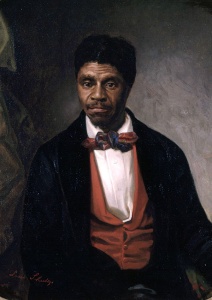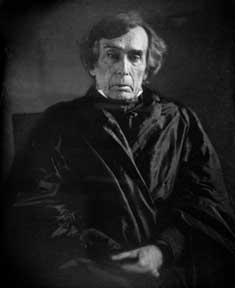In which we trace the reasoning of the worst decision the Supreme Court ever made
- Dred Scott, by Louis Schultze (1888).
What are we going to do, kids? How are we going to prevent a Civil War that seems like it’s heading straight toward us?
—I don’t think we can, Mr. K.
We’ve got to keep trying, don’t we?
—I’m not sure we do. Slavery is wrong. We need to dig in and end it.
Hmmm. You might be right, Sadie. In any case, we have another situation to look into. It involves a slave named Dred Scott.
—I’ve heard of him.
Right. Here’s the thing. Scott’s case is a little complicated, but basically it comes down to this. He’s the property of an army surgeon named John Emerson, who acquires Scott in Missouri, a slave state. But because he’s an army guy, Emerson moves around a lot. He gets reassigned, and is sent to Illinois. Dred Scott goes with him.
—Is Emerson allowed to do that?
Why wouldn’t he be?
—I think you said a while back that Illinois isn’t a slave state.
Right. So?
—How can you have a slave in a non-slave state?
Well, that’s easy, Ethan. Illinois has transit laws. You’re allowed to move your property across state borders.
—Yeah, but you said the surgeon guy moved to Illinois. Like now he lives there. So Scott should be free.
Emerson is stationed there. I believe that transit laws are good for up to a year. Should we be expecting you to squawk to the authorities on day number 366?
—I probably will.
Do you expect them to act immediately?
—Worth a try.
Probably not. Because by the time you would get any wheels in motion, Dr. Emerson and Scott would be gone. Emerson would have been ordered to Fort Snelling, which is in modern-day Wisconsin. Back then it was in the Minnesota territory.
—Minnesota. Too cold for cotton. And just about anything else, as far as I’m concerned. That can’t be slave territory. Scott is free as far as I’m concerned.
It isn’t and he isn’t, Em. And Dr. Emerson is willing to go with the flow: when in Rome, do as the Romans, or in this case, the Northerners, do. He hires Dred Scott out to other white men for pay—pocketing Scott's pay. But it isn’t an entirely bad deal for Scott. He gets married (for the second time; his first wife was sold away from him, and the marriage had no legal standing). Scott’s new wife, Harriet, had been the property of another man, but becomes Dr. Emerson’s property. When Dr. Emerson gets reassigned back to Missouri, he leaves the Scotts behind. Here things start to get complicated. Emerson himself gets married to a woman named Irene Sandford. They set up a household in Louisiana. They send for the Scotts. They’re on their way down when they have a daughter on a steamboat along the Mississippi River between Illinois and Iowa. That means she is free even if her parents aren’t. The Scotts are down in Louisiana, but then then Emerson goes back to Missouri. Serves in the Seminole War. Dies. Now the Scotts are the property of Mrs. Sandford—or at least by some reckonings they are. Scott has made many friends over the years, and have received financial and legal advice from them. In 1846, he sues for his freedom essentially using Ethan’s argument: that Dr. Emerson abused his slaveholding privileges and forfeited them. This is a legal case, and legal cases take time—like a decade. Dred Scott v. Sandford reaches the Supreme Court, where it’s finally decided in 1857.
—And?
- Roger Taney
No? OK, here’s a hint. John Marshall: he somebody I have mentioned.
Marshall? Anybody?
—Supreme Court.
And Yin comes through again in the clutch. Right: Marshall was the chief justice of the Supreme Court from the Jefferson through Jackson administrations. Once Marshall finally retires in 1835, his place gets taken by Taney (pronounced “Tawney”). By 1857, Taney’s been on the court for over twenty years, and he’s still got another seven to go. He’s seen all the controversies over Mexico, the Compromise of 1850, the Kansas-Nebraska Act. And now this. So it’s time to resolve this whole sectional crisis once and for all. And so this Maryland slaveholder leads the way in a 7-2 majority decision that goes against Scott.
—God. That’s awful. How does he justify that?
Bascially two ways, Sadie. The first is to deny that Scott really had any right to bring a suit in the first place—in legal terms, he has “no standing.” In the famous words of his decision, he’s got no rights a white man is bound to respect.
The second part of his decision involves the nature of slavery itself, as far as Taney is concerned. It’s a property right, and as such is protected by the Fifth Amendment. You can’t take away someone’s property without due process. So it doesn’t matter where you take your human property—or maybe I should say human property—regardless of where you go or how long you stay. Freedom is national.
—That can’t be legal.
He just made it legal, Sadie. What he did, in effect, is strike down the Missouri Compromise. You can’t draw a line creating free states and slave states, because citizens (which doesn’t include black people) always keep their constitutional rights in any of the United States. The people of Vermont, for example, might decide they don’t want to buy, own, or sell slaves. But they can’t stop someone from Alabama from bringing their slaves there.
—That’s just a horrible decision.
Well, it’s the law of the land. You will be obeying it, won’t you Kylie? Forgive me for asking, but you’ve made some mighty subversive suggestions in recent days.
—I don’t know what to think, what to obey.
Well, you’re not alone there. A lot of people are vowing to defy the law. Interestingly enough, one person who isn’t is that Abraham Lincoln guy.
—Him again.
Yeah, Em, him again. Even though he really blew it back in 1846 over the Mexico War, the guy won’t quite go away. He lay low for a while, getting rich as a lawyer back in Springfield, Illinois. But the Kansas-Nebraska Act seemed to set him on fire. Started speaking out about it like nobody’s business, like a man afire. For a while back in 1855, it looked like he might achieve his lifelong dream of becoming Senator. That fell through. But now he’s looking to challenge Senator Douglas for his seat. Long shot. Don’t think it will amount to much.
—Yeah, right.
Whatever, Em. Got more important things to talk about. Amid all these frustrations, it’s clear that more and more people are taking the law into their own hands. One crazy guy in particular. His name is John Brown.
Next: The freedom-fighter/terrorist

